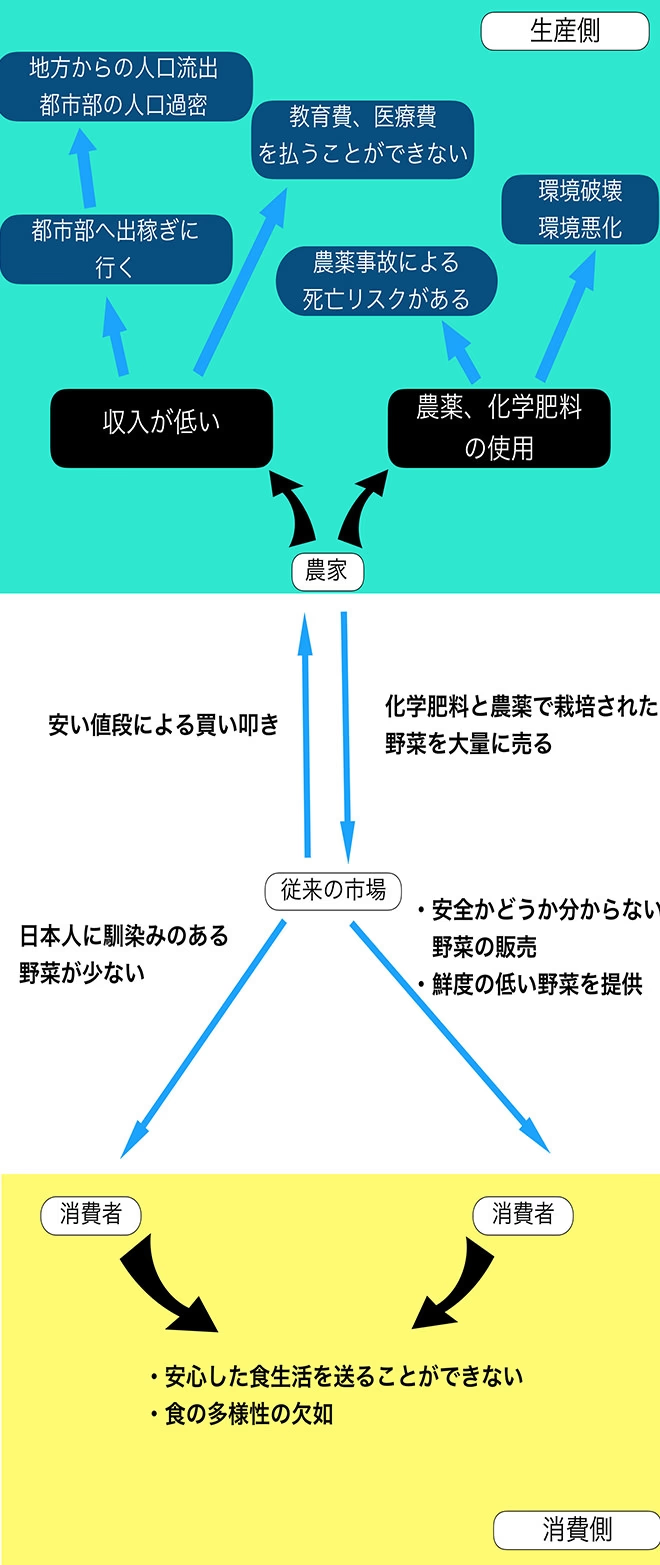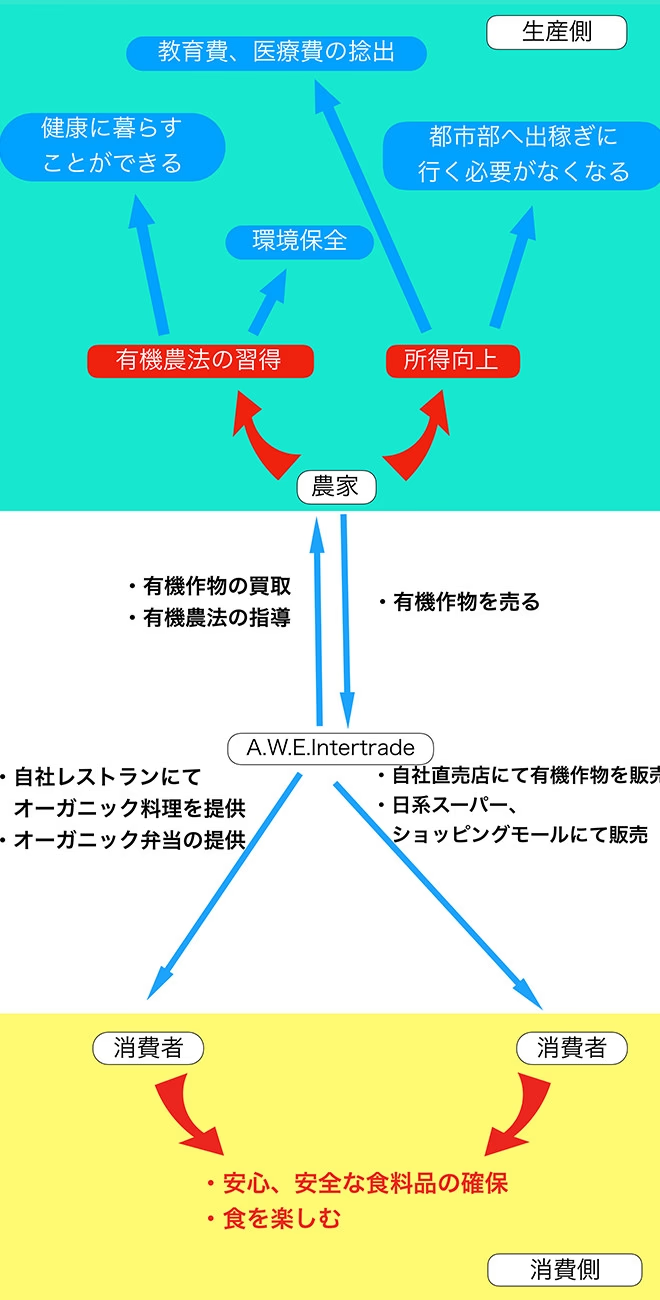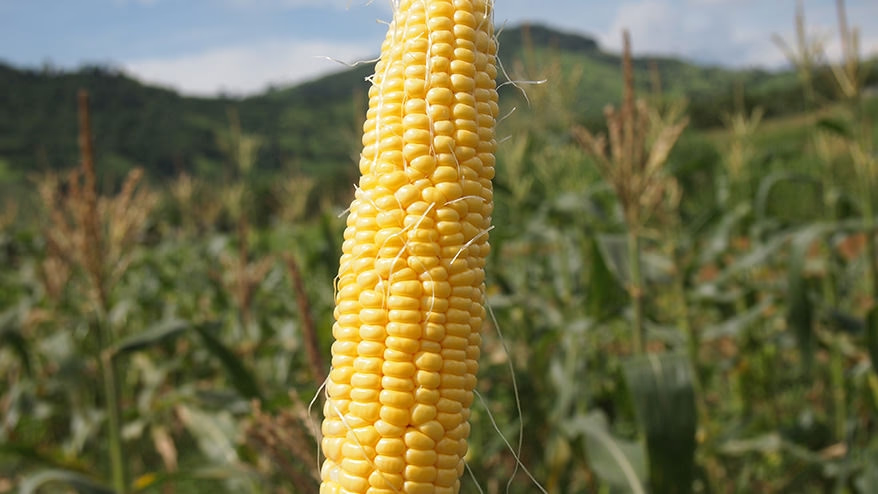Sawasdeeka! My name is Akamine and I've already been in Thailand for a year.
As Kawamura-san mentioned in his article , the culture of eating out is deeply rooted in Thailand, as exemplified by the delicious and inexpensive street food. However, since I have a weak stomach and most Thai food gives me an upset stomach, I have been cooking for myself since I moved here. However, one problem I ran into was not being able to find safe and delicious vegetables.
This time, we would like to introduce My Food (official name: AWEIntertrade), a company that operates a farm, direct sales store, and restaurant in Thailand, which has solved this problem.
"My Farm" Organically Grown Without Pesticides MY FOOD
I started going to My Food after being introduced to it by a friend who had been living in Thailand for a long time. The vegetable shop and restaurant are located on the second floor of a condominium along Soi 31 in Bangkok.
We also wholesale vegetables to a total of eight locations in Japanese supermarkets and major department stores in Bangkok.
First, let me introduce you to the vegetable shops and restaurants.

The condominium entrance along Sukhumvit Soi 31. There is a direct sales store and restaurant on the second floor.
The ingredients on offer include carrots, onions, potatoes, eggplants, cucumbers, radishes, lettuce, corn, peppers, spinach, broccoli, okra, tomatoes, shiitake mushrooms, etc. Vegetables that are familiar in Japan are all here. They also sell rice, meat, eggs, etc.
Every weekend, I do my shopping at a direct sales store or a supermarket in Bangkok, but by the evening most of the produce is sold out (apparently the waste rate is very low), so I often have to go from supermarket to supermarket in search of My Food vegetables.

At the direct sales store, you can purchase the day's specials at half price! The rice is also great, Japanese rice.
Next to the direct sales store is a restaurant, where all the dishes are made using organic vegetables grown on-site.

(Left) Open terrace seating (Right) A wide variety of set meals available
Why I choose my own food
Why do I trust My Food so much and continue to go there?
It may seem like a luxury, but up until now, I had hardly ever eaten vegetables grown by people I didn't know. My parents were part-time farmers, so I grew up eating the vegetables and rice that my family grew.
However, I didn't know anyone in Thailand, so I spent my days buying vegetables labeled "organic" at the supermarket. However, I remember being skeptical because I had no basis for it and actually didn't taste like vegetables when I ate them.
When I picked up some vegetables from My Food after being recommended by a friend, I was impressed by the fact that the spinach had soil on the stems (indicating freshness), that the radishes were sold with their leaves still attached (a sign of their confidence that they don't use pesticides), and that when I actually ate them, the vegetables had a strong flavor. I had finally found the flavor I was looking for in Thailand.
Since then, I couldn't let go of My Food ingredients, and as I ate them almost every day, I began to wonder where and who was growing the vegetables sold on My Food!
So, I went there!
Farm visit in Loei Province
MyFood has two farms in Thailand (in Loei Province and Chiang Mai Province), and this time I visited the farm in Loei Province. Loei Province is located in the northeastern part of Thailand (Isan region), and the farm is about an hour by plane and two hours by car from Bangkok.

(Left) Loei Farm is surrounded by mountains and is rich in nature. (Right) Fields and blue skies stretch out as far as the eye can see.
My Food's vegetables are called "vegetables from our fields" and are grown using organic farming methods without the use of pesticides.
They are committed to outdoor cultivation, and by using the soil of the land for organic farming, they are also contributing to environmental conservation.

(Left) A farmer tilling the red clay soil that is unique to Thailand in the heat. (Right) It's a little hard to tell from the picture, but rice husks are mixed in to create nutrient-rich soil.
My Food produces a wide variety of vegetables in small quantities. Small-scale production not only increases the added value of the vegetables, but also helps to avoid the risk of pests and disease. However, natural disasters cannot be prevented. However, by distributing the farm to two locations in Thailand, continuous production is possible.

I picked some fresh vegetables myself and immediately had them in a salad! They tasted like vegetables!!!
This farm tour in Loei province has become a regular event and started in January this year!
They also post daily updates and thoughts about the farm on their blog .
My Food's Goals
Since I started talking with My Food's President Yoshio Yanagisawa after we went on a farm tour together, there is one thing I always hear him say.
"As long as everyone is happy, that's good enough."
The "everyone" in question seems to refer to the Thai farmers who produce the food, the employees who work at MyFood, and the customers who are the consumers.
"To create a system through agricultural business that allows producers and consumers to live in peace."
As mentioned above, it is difficult to find pesticide-free vegetables in Thailand that can be eaten safely, and at the same time, there are risks for producers due to pesticide accidents.
By providing instruction on how to cultivate high-added-value vegetables and then securing a market for them and a stable income, Yanagisawa aims to provide peace of mind for both producers and consumers, while also helping to solve the social problem of "protecting the natural environment."
*The following details are taken from the My Food website .
Problem flow from the perspective of Thai producers and consumers

MyFood's solution flow

In addition, he said that he will be working on cultivating fixed varieties * in the future, and he was enthusiastic about wanting everyone to eat real vegetables! I can't wait to be able to eat those vegetables.
*Fixed varieties: Also known as native varieties, these are seeds that are created after harvest and continue to reproduce every year. Because they take root in the soil, they can be cultivated without relying too much on fertilizers or pesticides, and they are said to have the original flavor of vegetables. Currently, the most common on the market are "F1 varieties," which are artificially created seeds that last for only one generation. F1 varieties are suitable for mass production because they are uniform in shape and size.
My Food bento joins Monotai's corporate cafeteria
Monotai provides company cafeterias three times a week. We get food delivered from nearby restaurants, but when I heard that My Food had started selling bento lunches last year, the first thing that came to mind was to introduce them to Monotai's company cafeteria!
Of course, I wanted everyone to eat delicious food, but more than anything, I wanted to eat it myself (laughs).

It comes with green tea and costs 150 baht (about 450 yen in Japanese yen)! There is a wide variety of food. In fact, it was because of this company cafeteria that My Food created a system where if you order for 6 or more people, the price is 150 baht! (It's actually 180 baht) I'm so happy!
What I'm Eating
My interest in food began when I spent six months in Kamiyama Town, Tokushima Prefecture, as a student of the second class of Monosasu Juku. There were two big encounters. The first was when I was asked to provide food at an event held jointly by Kamiyama and Monosasu Juku students, and had the opportunity to visit a farmer in Kamiyama to use local ingredients. As I met the farmer, listened to his story, and was shown around the farm, I realized that these were not just vegetables, but "Mr./Ms. XX's" vegetables. I was very happy to be able to eat safe and delicious ingredients, knowing who was growing them.
The second reason was my encounter with the Food Hub Project . As my family farms, I was particularly interested in "social agriculture." I was attracted by the initiative, which aims to solve social problems in mountainous areas, including my hometown, and above all by the desire to have people eat delicious food.
The things I want to eat every day are those that have a lot of thought put into them, even if it's just a single vegetable. I feel really happy to be able to eat food that people I know say please with a smile, and to know that eating it connects me to someone.

(Left) President Yanagisawa, who always speaks in a friendly manner in Osaka dialect. (Right) The staff working at My Food.
What I eat = My Food is delicious vegetables and rice made by the wonderful people I met in Thailand. It looks like My Food will be doing something new around Prakanong Station, where Mono Thai is located, so I'll keep an eye on it!

